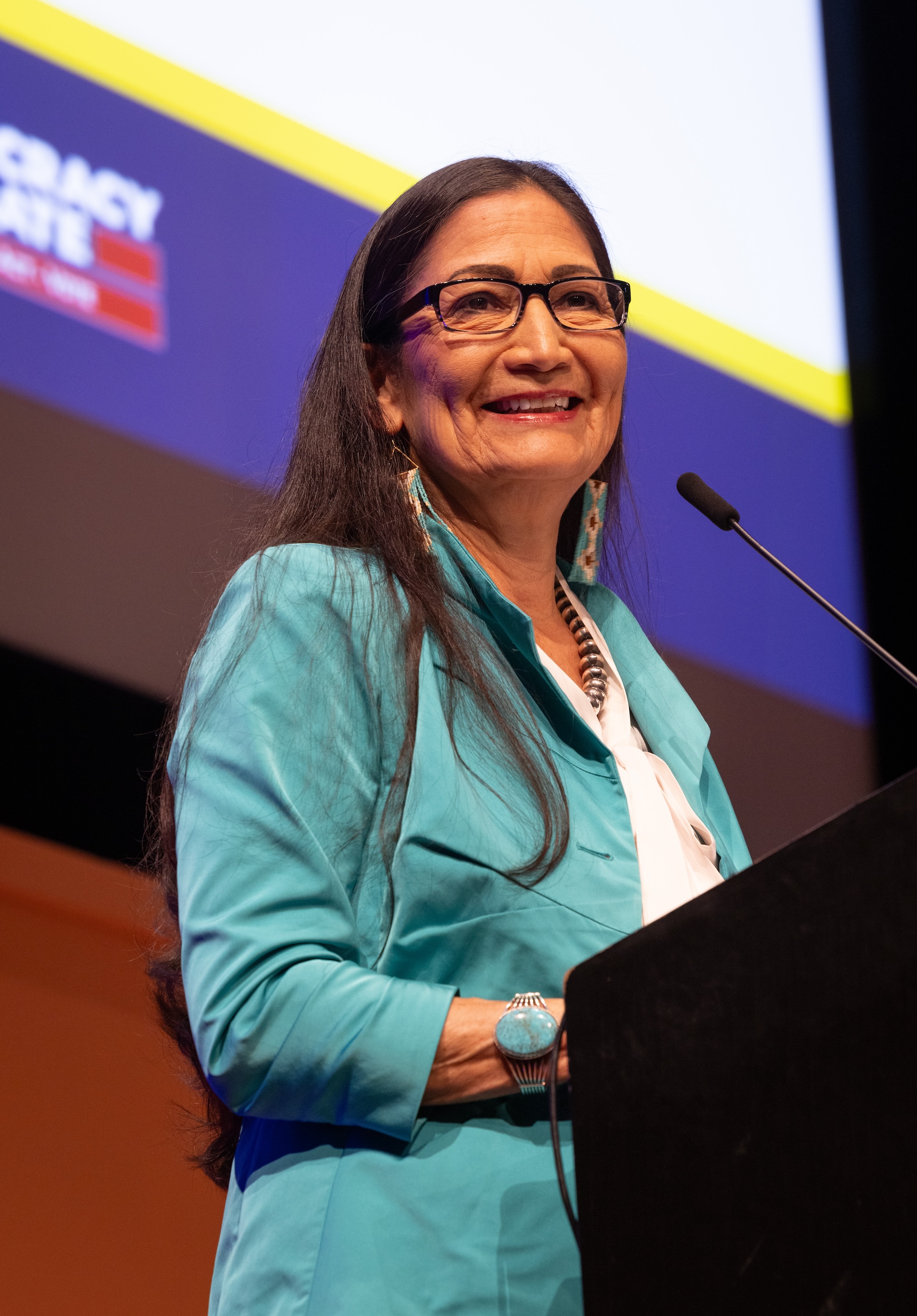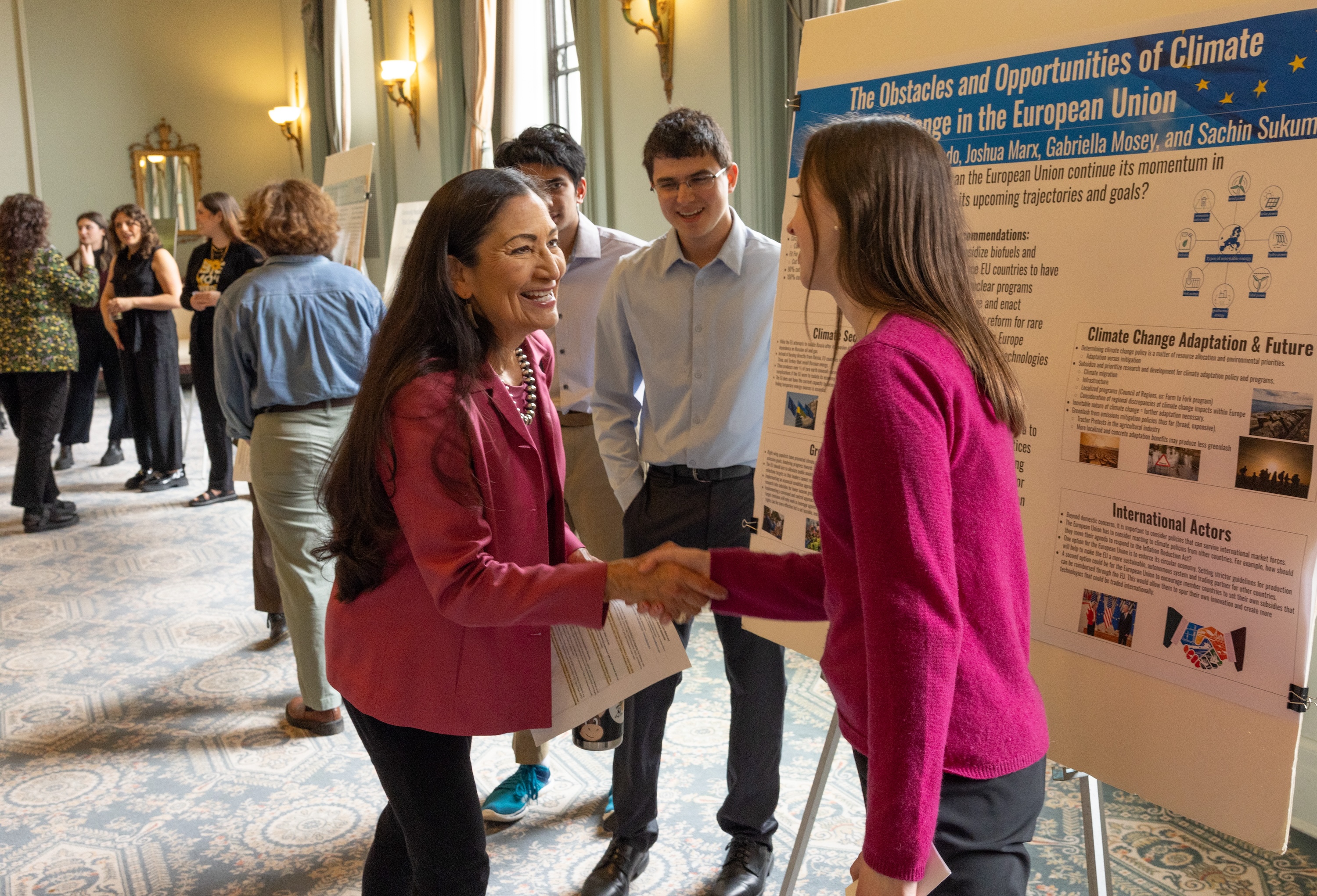
 back to all news
back to all news
Secretary of the Interior speaks at U-M addressing the climate crisis and environmental justice: "Now is not the time for business as usual"

To effectively address the climate crisis with justice at the core, we need community-based action that brings everyone to the table, said Secretary of the Interior Deb Haaland on March 26 during a talk at the University of Michigan.
"To get this historic work accomplished with everyone at the table, we're fundamentally changing how we work with states, Tribal nations, and the labor community. It's important for us to connect early and often with the communities whose lives we want to positively affect. This is part of our commitment to environmental justice.”
Haaland described herself as someone who has always been “a bit climate obsessed,” and said that, for her whole life, she has been “that person” who made recycled cardboard signs for climate protests, carried a reusable bag, made sure everyone had refillable water bottles and who keeps a compost pile at home.
“Years later, I’m still that person, and my team at the Interior will be the first to agree,” she said. “This dedication to our environment and to protecting our planet by changing our habits and the way we think about the gifts that this earth gives us every single day. These are the values that I've carried with me for a very long time. They are the enduring lessons my grandparents and parents passed down to me and my siblings.”

Haaland, who is the first Native American to serve as cabinet secretary and one of the first Native American women to serve in Congress, said that it is these very lessons that shape her actions as secretary and how she views the meaning of environmental justice, but emphasized that these individual actions are not enough in the face of climate change.
“Even though we strive to live the lives that respect the earth and its ecosystems, we know that individual actions alone won't solve the existential threats that our world faces. Everyone in this room understands these simple truths. The climate crisis is real. It is happening now, and it's uprooting lives across our planet,” Haaland said.
She went on to describe some of the ways that climate change is having tangible impacts around the globe, and how she is hopeful about the progress being made through President Biden’s Investing in America agenda.
"As we focus on this urgent and overdue transition to a better future, we're supercharging our efforts. We're doing this through the approval of dozens of new renewable energy projects on our nation's public lands that are bringing affordable, clean energy to millions of households. These projects—from solar to geothermal to new transmission lines—stretch from California to Arizona to Wyoming, with many more under review," Haaland said, adding that these efforts in clean energy, including wind energy projects, will create new job opportunities in engineering, environmental science and more.
Haaland then turned her attention to legacy challenges in historically marginalized communities, such as abandoned coal mines and orphaned oil and gas wells that leach toxic fumes.
“Legacy pollution stories abound because environmental injustice persists across our country, disproportionately hurting poor people and people of color. Fueling our response to the injustices is $16 billion from the president's bipartisan infrastructure law going directly toward addressing legacy pollution in our country,” Haaland said, emphasizing that expediently delivering the funding to states and Tribes is a priority for the DOI and that she had announced that same morning that nearly $6 million in funding would go to plugging and cleaning orphan wells in Michigan.
Haaland also described other challenges the DOI is tackling under her leadership, including drought conditions and wildfires in the Western U.S. and wildlife conservation and restoration.
Essential to the success of all these efforts, Haaland said, is how the DOI functions.
“In fact, the way our organizations function can also be part of the climate solution, both at the Department of the Interior and right here in Michigan because it's abundantly clear that even as we transition toward a sustainable future, adaptation and resilience must continue to be core pillars of our collective climate response,” she said. “Last year, we announced the first-ever effort to factor the climate crisis into all operations at the department. A suite of new policies will strengthen and enhance mission-critical decisions and activities. These include updated policies that integrate priorities like adaptive management, Indigenous knowledge and climate adaptation directly into the DNA of how the department works and how our decisions are made.”
As part of this, Haaland emphasized the importance of including all—especially those in marginalized communities—in federal-level decisions that aim to build an equitable future.
“I'm optimistic because we have the tools, the resources and the passion to make our future what it should be, but we also need young folks on the ground in the federal government, even in the Department of the Interior, leading the way and using the resources that our historic Investing in America agenda has made possible. The work that needs doing won't get finished on its own, and we need your leadership, whether that's as an American Climate core member, as a scientist at the Department, or a leader within one of our partners across the country to bring all of it to life.”
The event concluded with a Q&A session moderated by School for Environment and Sustainability Professor Kyle Whyte, where U-M students had the opportunity to ask Haaland questions on various topics ranging from the Line 5 pipeline, an issue that was raised earlier in the talk by an audience member, to supporting Tribes in their efforts to revitalize Indigenous languages.
Before the talk, Haaland attended a student poster session where she interacted with 14 student project groups to learn about their work. The projects she learned about focus on environmental justice, Indigenous communities, Land Back movements, climate change, conservation projects, and more.

Watch the video of Haaland’s lecture below.

